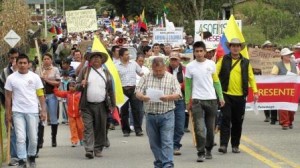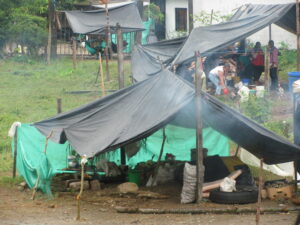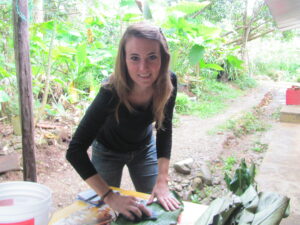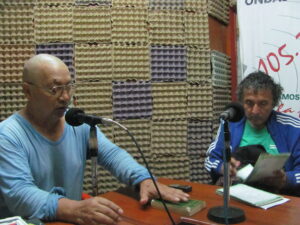Engaged Anthropology Grant: Kristina Lyons

The Wenner-Gren Foundation awards the Engaged Anthropology Grant to former grantees in order to allow them to return to the field and share their work with the community that hosted them. In keeping with the grant’s purpose of breaking contemporary anthropological research outside of the confines of one’s home institution and the English-speaking academy at large, we require those awarded to write a guest blog post describing their experience, as an accessible way to learn about the ways anthropologists and the Wenner-Gren Foundation are supporting engaged, equitable scholarship. In today’s entry, we welcome Kristina Lyons, UC President’s Postdoctoral Fellow at the University of California-Santa Cruz in Anthropology and the Center for Science & Justice, who originally received a Dissertation Fieldwork Grant in 2007 while a doctoral candidate at the University of California-Davis to aid research on ‘Science, Storytelling, and the Politics of Collaboration: Advocacy against Aerial Fumigation in Colombia,’ supervised by Dr. Marisol de la Cadena.
“Make sure the right anthem is going to sound off,” jokes Profe Miguel, provoking a loud round of laughter among us. “Not the national anthem, but el himno del pueblo [the anthem of the people]!”
The crackle of the loudspeakers brings three thousand small farmers to their feet. Some lightly tap the beat, others mouth the lyrics meditating behind closed eyes or sing aloud in low voices. The commission of government representatives attending the meeting this morning also stands tall. I search their eyes wondering what kinds of emotions are veiled behind a row of stoic faces.
“And now the pueblo that rises up in the struggle
with the voice of a giant shouting: forward, forward!
The pueblo united will never be defeated…”

Originally composed and taken up as the international anthem of the Chilean resistance movement after the September 11, 1973 military coup, this song can be heard celebrating the spirit of hope, unity and struggle in mass rallies, marches and demonstrations around the world. Today, on the 17th day of the National Agrarian and Popular Strike in Colombia, we are at the negotiation table between regional small farming leaders and state officials in Villagarzón, Putumayo. The national government has arrived to request that protestors unblock Putumayo’s highways in exchange for the negotiation of regional-level reforms to agrarian policy, infrastructure and social investment. Small farming leaders, however, argue that they will only lift the strike if and when President Santos recognizes and agrees to negotiate with the National Working Group of Dialogue and Accord (MIA) that gathers together the demands of all the sectors participating in the strike: the country small and medium farmers, small miners, and health and transportation sectors. The MIA is calling for the suspension of the free trade agreement with the United States in order to address crisis in the nation’s agricultural sectors; the participation of small miners in mining policy and an end to a national development model fueled by extractive industry; the recognition of the political and territorial rights of rural communities; alternative legislation to combat the increasing privatization of health and education; and a reduction in the exuberant cost of transportation and fuel. An evident tension exists between the State’s desire to contain the strike by promising regional-level reforms, and the MIA’s intention to achieve deep structural transformations in the nation’s political and economic model. No agreement can be reached this morning. The strike continues compañeros.

Agricultural practices in southwestern Colombia have been a site of contention since the 1980s when illicit coca production soared and provoked military-led state and foreign policy responses (i.e. the U.S.-Colombia “War on Narcoterror”) aimed at its eradication. My dissertation fieldwork between 2005-2011 was set in a region where the “securitization of development” not only attempts to eradicate illicit crops, but to discipline the productive capacities and contested governance of tropical forest ecologies in ways that forcibly equip them to become “modern” and “moral” landscapes of licit capitalist worlds. Though USAID export-oriented strategies to substitute coca prove attractive to many rural families, my research explored the way a growing network of farmers and soil scientists have begun to counter these official “solutions”, arguing they foment extractive practices that subordinate Amazonian ecologies to profits; exacerbate the scarcity of local food and markets; and ultimately, fail to eradicate coca and its deriving violence. Thus, my dissertation fieldwork not only followed the material practices of farmers and scientists, but also tracked how in both their projects, albeit differentially, rather than an entity from which production can be extracted, soils take on new meanings and capacities as what I conceptualize as “partners in/for life”. This provision leads to struggles between farmers, technocrats, politicians, aid workers and scientists over the meaning of “peace”, “productivity”, “rural development”, “sustainability”, and what constitutes a “good and healthy life”.

Upon returning to Bogotá and Putumayo with the support of the Wenner-Gren Engaged Anthropology grant between June and September 2013, I was able to contribute to national and regional debates about local alternatives to “illicit” coca cultivation, the historical social abandonment of rural frontier zones, and resistance to ago-industrial development during a time when “agrarian issues” have emerged at the core of the national peace process between the Colombian State and FARC guerrillas to end the country’s fifty-year armed conflict. While in Bogotá, I circulated my dissertation among soil scientists with whom I conducted fieldwork, and forged new collaborative initiatives with other academics working in the Amazon, as well as contributing to a research project at the Center for Historical Memory that was established through the Law of Victims and Land Restitution. In Putumayo, due to the particular conjuncture of the national strike, my dissertation was able to contribute to community training workshops on the Plan for Integral Amazonian Development proposed by and for small farmers in the region, as well as joining the technical team accompanying strike leaders in their negotiations with state officials. I returned dissertation materials to the farming families that are the protagonists of my research, and received their feedback and selection of photographs, stories and designs to be included in a future book manuscript. Furthermore, the socialization of my dissertation material this summer served to propose and fund a documentary film project that will transmit Amazonian-based farmer-to-farmer agricultural knowledge and practices among an extensive network of small-farming associations in the department of Putumayo. This continued engagement project will draw out the potential collaborations that can emerge between two kinds of local knowledge – science and non-science – in order to highlight the cultural stakes of the rural life-worlds struggling to emerge in a geopolitically contentious agricultural frontier.